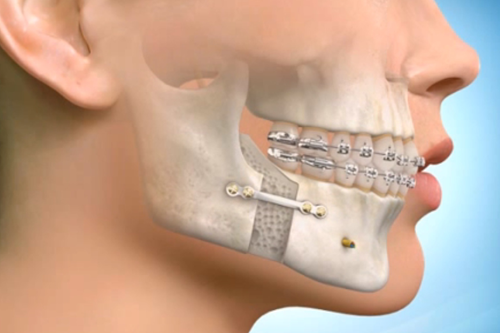
Orthognathic surgery, sometimes known as jaw surgery, is a surgical procedure to realign the jaw and repair bone abnormalities caused by congenital disability, accident, or excessive jaw bone growth.
About Orthognathic Surgery
Orthognathic surgery is typically advised if your jaw issues cannot be addressed by orthodontics alone. It is a complicated procedure that requires general anaesthesia. Visit a dental specialist in Mumbai to learn more about orthognathic surgery, its types, the procedure, its benefits, and any potential side effects.
Who Qualifies for Orthognathic Surgery?
Orthognathic surgery is most successful when performed between the ages of 16 and 22. Visit a dentist near you to know if orthognathic surgery is appropriate for you. If you suffer from any of the conditions below, visit the best dental clinic in Mumbai near you immediately.
Why is Orthognathic Surgery Conducted?
- Corrects the alignment and bite of the teeth to improve the functions of biting, chewing, and swallowing
- Correcting face symmetry
- Repair of congenital disabilities such as the cleft palate
- To improve breathing problems such as mouth breathing or obstructive sleep apnea
- Alleviation of pain due to temporomandibular joint dysfunction (TMJ)
Visit a dental clinic in Mumbai for orthognathic surgery.
Who Can Perform Orthognathic Surgery?
Orthognathic surgery is often carried out by an oral and maxillofacial surgeon working in collaboration with an orthodontist. To consult with an oral and maxillofacial surgeon, visit the best dental clinic in Mumbai.
How is Orthognathic Surgery Performed?
Orthognathic surgery is performed under general anaesthesia. Since the procedure is usually done inside the mouth, there are no external incision scars after surgery. However, rare occasions may require a few minor incisions outside the mouth.
To correct your jaw bone deformity, your surgeon may cut into the jaw bone to align it properly. The jaw bone is then fixed in this position with the help of bone plates, wires, or screws until it heals.
What are the Different Types of Orthognathic Surgery?
Visit a dental surgeon near you to know which type of surgery is required for your condition:
- Surgery of the upper jaw (maxilla) – Maxillary osteotomy
- Surgery of the lower jaw (mandible) – Mandibular osteotomy
- Surgery of both the upper and lower jaws – Bimaxillary osteotomy
- Surgery of the chin – Genioplasty
What are the Benefits of Orthognathic Surgery?
- Improves facial appearance and increases self-confidence
- Optimises the dental functions of chewing and biting
- Rectifies speech impediments
- Improves swallowing and breathing
- Reduces pain caused by temporomandibular joint dysfunction (TMJ)
What are the Possible Complications of Orthognathic Surgery?
- Bleeding
- Nerve injury
- Fracture of the jawbone
- Recurrence of misalignment of the jaw
- Misplacement of a jawbone piece
- You may require root canal treatment for a few teeth
Conclusion
Orthognathic surgery can be life-changing for some as it improves the looks and breathing and swallowing issues. However, it is a complicated surgery with a lengthy recovery period. Discuss beforehand the possible outcome and risks of the procedure with the best dental surgeon in Mumbai.
For best results, get your orthognathic surgery done at the best dental hospital in Mumbai by an expert oral and maxillofacial surgeon.
Request an appointment at, Apollo Dental, Mumbai Call 1800 1020 288 to book an appointment OR click on this link
The cost of jaw surgery is determined by the type of operation, the surgeon, the area, and the hospital. Check with your medical insurance provider to see if you are covered for orthognathic surgery.
You may be able to resume work or school in 1 to 3 weeks, depending upon the type of surgery you had.
You must adhere to your surgeon’s instructions about what to eat and how to take care of your oral hygiene after the operation. For a few weeks, you should avoid any heavy exercise or smoking.



















































